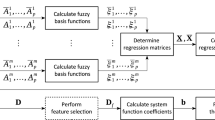Abstract
In general, evaluating an object is mainly expressed by natural language. It is not easy for people to evaluate an object with accurate mathematical methods. In this paper, partially connected type-2 fuzzy sets, linguistic dynamic systems and fuzzy comprehensive evaluation are used to evaluate an object, and the evaluation results are expressed by type-2 fuzzy sets. The method of evaluation is presented and the results indicate that this method is both feasible and effective.





Similar content being viewed by others
References
Wang, F.-Y., Mo, H.: Some fundamental issues on type-2 fuzzy sets. Acta Autom. Sin. 43(7), 1114–1141 (2017)
Mo, H., Wang, F.-Y., Zhou, M., et al.: Footprint of uncertainty for type-2 fuzzy set. Inf. Sci. 272, 96–110 (2014)
Wang, F.Y., Mo, H., Zhao, L., Li, R.M.: Linguistic dynamic orbits in the time varying universe of discourse. Acta Autom. Sin. 38(10), 1585–1594 (2012)
Mo, H., Hao, X.X., Zheng, H.B., Liu, Z.Z., Wen, D.: Linguistic dynamic analysis of traffic flow based on social media—a case study. IEEE Trans. Intell. Transp. Syst. 17(9), 2668–2676 (2016)
Wang, F.-Y.: On the abstraction of conventional dynamic systems: from numerical analysis to linguistic analysis. Inf. Sci. 171(1–3), 233–259 (2005)
Mo, H., Wang, F.-Y.: Linguistic dynamical systems based on computing with words and their stabilities. Sci. China F Ser. Inf. Sci. 52(5), 780–796 (2009)
Zadeh, L.A.: Fuzzy logic=computing with words. IEEE Trans. Fuzzy Syst. 4(2), 103–111 (1996)
Wang, F.-Y.: Outline of a computational theory for linguistic dynamic systems: towards computing with words. Int. J. Intell. Control Syst. 2(2), 211–224 (1998)
Zadeh, L.A.: Fuzzy sets. Inf. Control 8(3), 338–353 (1965)
Zadeh, L.A.: The concept of a linguistic variable and its application to approximate reasoning-1. Inf. Sci. 8(3), 199–249 (1975)
Li, Y., Sun, Z.D., Han, L., Mei, N.: Fuzzy comprehensive evaluation method for energy management systems based on an Internet of Things. IEEE Access 5, 21312–21322 (2017)
Mendel, J.M.: Uncertainty, fuzzy logic, and signal processing. Signal Process. 80(6), 913–933 (2000)
Ma, X.Y., Wu, P., Zhou, L.G., Chen, H.Y., Zheng, T., Ge, J.Q.: Approaches based on interval type-2 fuzzy aggregation operators for multiple attribute group decision making. Int. J. Fuzzy Syst. 18(4), 697–715 (2016)
Wang, F.-Y.: Fundamental issues in research of computing with words and linguistic dynamic systems. Acta Autom. Sin. 31(6), 844–852 (2005)
Wang, F.-Y.: Computing with words and a framework for computational linguistic dynamic systems. Pattern Recogn. Artif. Intell. 14(4), 377–384 (2001)
Wang, F.-Y.: Outline of a computation theory for linguistic dynamic system: toward computing with words. Int. J. Intell. Control Syst. 2(2), 211–224 (2000)
Wang, F.-Y., Lin, Y.T., Pu, J.B.: Linguistic dynamic systems and computing with words for complex systems. In: IEEE International Conference on Systems, Man, and Cybernetics, vol. 4, no. 4, pp. 2399–2404 (2000)
Zhang, T., Chen, C.L.P., Chen, L., Xu, X., Hu, B.: Design of highly nonlinear substitution boxes based on I-Ching operators. IEEE Trans. Cybern. 48(12), 3349–3358 (2018)
Chen, C.L.P., Zhang, T., Chen, L., Tam, S.C.: I-Ching divination evolutionary algorithm and its convergence analysis. IEEE Trans. Cybern. 47(1), 2–13 (2017)
Zhang, T., Su, G., Qing, C., Xu, X., Cai, B., Xing, X.: Hierarchical lifelong learning by sharing representations and integrating hypothesis. IEEE Trans. Syst. Man Cybern. Syst. https://doi.org/10.1109/TSMC.2018.2884996 (to appear)
Acknowledgements
The work was supported by National Nature Science Foundation of China (NO. 61473048, 61074093).
Author information
Authors and Affiliations
Corresponding author
Rights and permissions
About this article
Cite this article
Mo, H., Wei, L., Zhao, X. et al. Linguistic Dynamic Analysis and Evaluation Based on Partially Connected Type-2 Fuzzy Sets. Int. J. Fuzzy Syst. 21, 2147–2154 (2019). https://doi.org/10.1007/s40815-019-00712-z
Received:
Revised:
Accepted:
Published:
Issue Date:
DOI: https://doi.org/10.1007/s40815-019-00712-z




